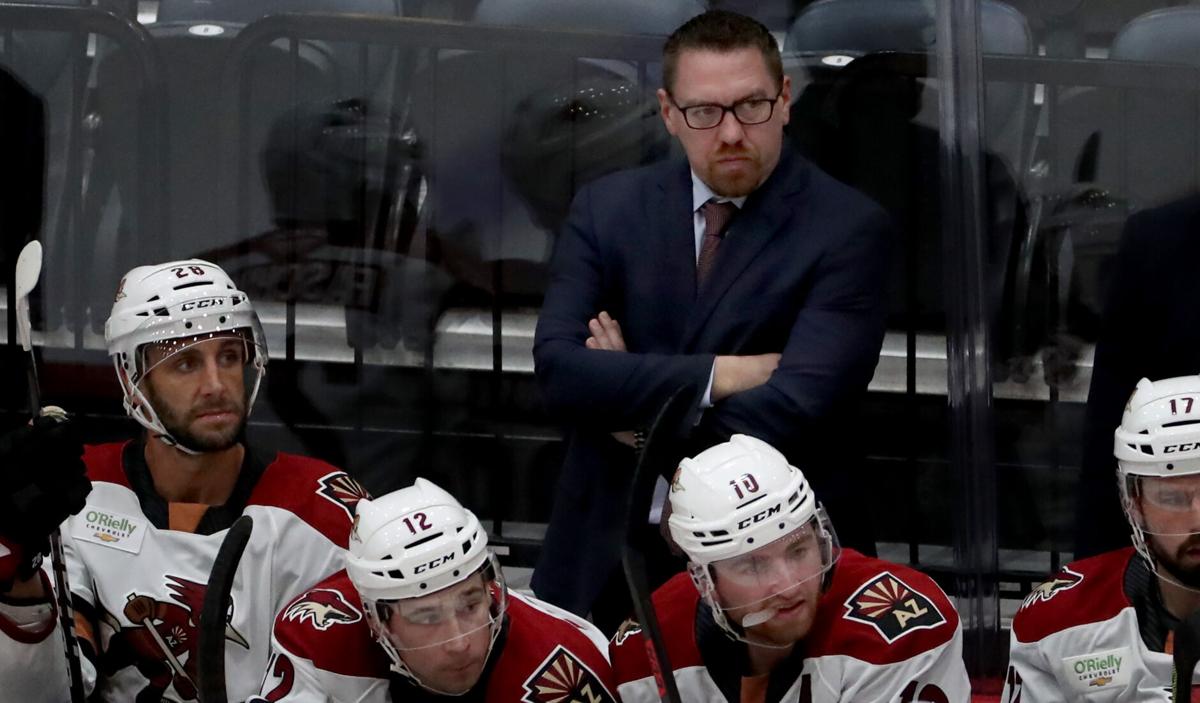Standing in almost the exact same spot as he did following his team’s 4-2 loss back on March 11, 2020, Tucson Roadrunners coach Jay Varady met with local media last week as the team opened training camp inside Tucson Arena.
“Soon as I got on the ice, right away, I was like ‘Oh, here we are. Let’s go. It’s good to be back,’” Varady said.
It’s almost as if he never left.
Almost.
Varady coached the Roadrunners to a division title in the 2019-20 season, one that ended early with the onset of the coronavirus pandemic. He spent last season as an assistant coach with the NHL’s Arizona Coyotes.
Now he’s back with the Roadrunners, back in his old office — and back in the driver’s seat as he returns to his once-and-again role as head coach. The Roadrunners will open their 2021-22 season Friday night against the Heat in Stockton, California. The club’s home opener is scheduled for Oct. 23.
People are also reading…
“You know what you’re going to get from Jay, what he’s delivered in the past,” Coyotes general manager Bill Armstrong said. “Jay and I go way back. … I just have a tremendous amount of respect for what he brings to the table.”
If there’s one word that’s been synonymous with Armstrong during his 13 months as an NHL GM, it’s “rebuild.”
Armstrong has almost completely overhauled the Coyotes’ NHL roster — and the coaching staff, too. He’s traded away on-ice leaders at both the NHL and American Hockey League levels for an overflow of early-round draft picks as he works to makes the Coyotes contenders.
It’s telling, then, that Armstrong hasn’t tinkered much with Tucson’s coaching staff — except, that is, to put back together the same division-winning bench from two years ago.
That includes the retention of last year’s head coach, Steve Potvin, who will serve as an assistant — hardly an easy ask after he guided the Roadrunners through a 35-game rush of a regular season last spring.
John Slaney, the blueline wizard on staff with either the Coyotes or Roadrunners the last seven seasons, returns, too.
“I’m glad we’re back together. I’m glad (Armstrong) trusts us to have this kind of responsibility because we know what type of rebuild this is going to be,” Potvin said. “It’s going to bring in a lot of new players — young players — that are really going to be a big part of our future, organizationally speaking.
“It means a lot that they trust us — that they’re willing to hand us their biggest assets in order to help create some NHL players and you know, one day win a Stanley Cup. That’s the bottom line, and that’s what they want. We’re on the right page to try to accomplish that, really.”
Potvin is in perhaps the most unique situation of all.
“Of course, you know, I want to be a head coach. I want to keep in continuing my career progressing,” he said. “But honest to goodness, my first reaction, I wasn’t in love with the idea. But that only lasted a little while. I really like what we’re doing here. I really believe in the organization.”
Slaney said he’s not surprised Potvin chose to stick around.
“In Steve’s case, I know how much he enjoys working with these players, and I’m in the same situation. You could almost say that these are like our own sons, really,” Slaney said. “When these kids actually leave and go up to the National Hockey League, it makes us feel good about getting these kids to that next level. That’s what their dreams are.”
Varady said it’s the wide range of experience the three of them bring together makes this particular coach’s room tick.
“These guys know this level, and the know the hard part the players are going through,” he said, noting that while Slaney is an AHL Hall of Fame defenseman, Potvin has experience now as a skills coach, an AHL assistant, and an AHL head coach on his resume. “If you watch these guys operate, it’s a lot of stuff that happens outside of rinks.
“It’s when we’re sitting in airports waiting for the Southwest flight and ‘Potsie’ is in the corner of some airport talking (to the players). Or it’s the coffee that ‘Slanes’ is having in the locker room before practice when I’m looking for him to do a drill. These are the things that makes these guys special.”
Varady said perhaps the best thing about the trio coming back together is “we all grew” last season in different ways.
“Those guys had huge roles down here, with more job responsibilities,” he said, acknowledging that Tucson had only two on-ice coaches in Potvin and Slaney last season, as opposed to the three previously and again this year.
“Everything happened so fast with Jay going up (in January),” Slaney said of last season. “But Potsie and I had worked together for four years. We could just understand what both of us were thinking, even though there was a guy missing there.”
Varady said that as much as he thinks things will feel somewhat the same, he wants them to be different, too.
“It’s easy to go back and do exactly what we had done before,” he said. “But I don’t think we’re going to do that. I think we all took some things (from last season) that that we want to work on. We want to continue to grow.”











